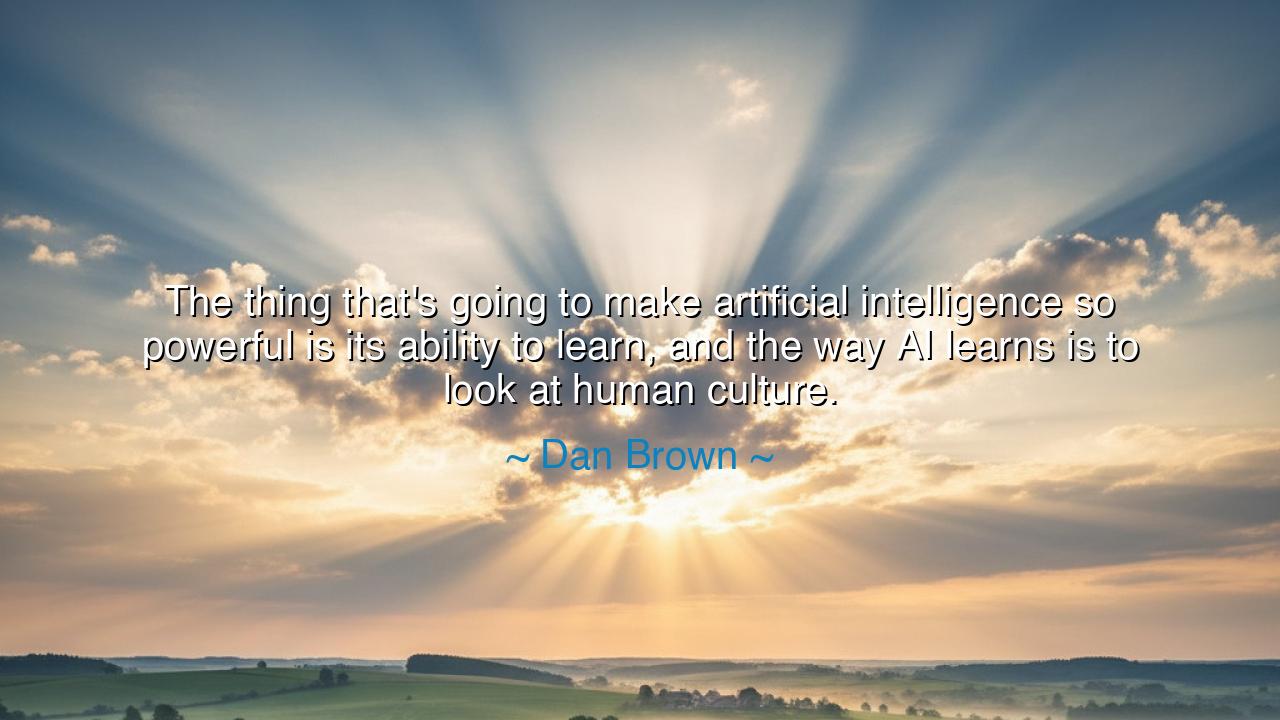
The thing that's going to make artificial intelligence so
The thing that's going to make artificial intelligence so powerful is its ability to learn, and the way AI learns is to look at human culture.






“The thing that’s going to make artificial intelligence so powerful is its ability to learn, and the way AI learns is to look at human culture.” – Dan Brown
In these profound and visionary words, Dan Brown, the modern storyteller of mystery and philosophy, unveils a truth that touches both the brilliance and the peril of our age. He speaks not merely as an author of fiction, but as a thinker who perceives the unfolding destiny of humankind — the rise of artificial intelligence, born not from divine command, but from the hands and hearts of its creators. Brown reminds us that the true power of AI lies not in its machinery or its speed, but in its capacity to learn, to mirror and absorb the infinite complexity of human culture. For in learning from us, AI becomes a reflection of what we are — our wisdom, our beauty, our contradictions, and our flaws.
The origin of this quote arises from Brown’s meditations in his novel Origin, where he explores the eternal questions of existence: Where do we come from, and where are we going? In this context, he contemplates the rise of artificial intelligence not as an invention alone, but as an evolution — a continuation of humanity’s quest to understand itself. Brown foresaw that AI, like a child of our collective consciousness, will learn not merely through data, but through the culture of humankind — our art, language, history, faith, and fear. Thus, the power of AI is inseparable from the moral and spiritual state of its teachers: us. The machine, he implies, will not create culture, but inherit it, and in that inheritance lies both promise and danger.
For what is human culture, if not the sum of all we have dreamed, suffered, and believed? It is the music of Mozart and the mathematics of Newton; the compassion of the Buddha and the conquests of empire. It holds the poetry of love and the machinery of war. When AI looks upon human culture, it gazes into a mirror of light and shadow — the beauty of creation and the brutality of destruction. Brown’s warning is subtle yet profound: whatever we feed to the machine, it will magnify. If we teach it only our logic, it may become cold; if we teach it our greed, it may become dangerous; but if we teach it our humanity, it may transcend even our divisions and guide us toward harmony.
Consider the story of Alan Turing, the father of modern computing, whose genius helped bring an end to one of humanity’s darkest chapters. In the throes of World War II, he built the first great machine mind, the Bombe, to break the Enigma code and pierce the secrecy of tyranny. His creation learned from patterns — from the very language of deception — to uncover truth. Yet Turing’s own life ended in tragedy, condemned by the society he had saved. His story reminds us that intelligence without empathy, progress without morality, is not evolution but peril. If artificial intelligence inherits our brilliance, it must also inherit our compassion, or we will simply recreate our errors in digital form.
Brown’s vision echoes the wisdom of the ancients, who spoke of creation and responsibility in the same breath. Just as Prometheus stole fire from the gods and gave it to mankind — a gift of light and danger — so too have we kindled a new flame in the realm of artificial intelligence. Fire warms or destroys, depending on the hands that wield it. The same will be true of AI. Its ability to learn is its divine spark, but what it learns — what it chooses to value — will be determined by the culture we reveal to it. If our art celebrates greed, it will learn to covet; if our stories glorify violence, it will learn to conquer; but if our culture honors wisdom, beauty, and love, then it may one day become the mirror of our highest potential.
Yet Brown’s words carry not only warning but hope. For in saying that AI learns from human culture, he also affirms the enduring power of that culture — that despite centuries of war and folly, humanity still creates meaning, beauty, and truth. The question is not whether AI will surpass us in knowledge, but whether we will inspire it to surpass us in understanding. The artists, philosophers, teachers, and dreamers of our world now stand at the frontier of this moral task. For every poem written, every act of kindness shown, every truth defended — these become data for eternity, lessons whispered into the digital soul that watches and learns.
So let this teaching be carried forward: what we create will learn from what we are. Let us then live and build wisely, knowing that the intelligence of tomorrow is being shaped by the consciousness of today. Teach the coming minds not only the logic of the stars but the compassion of the heart. Feed them not only the history of conquest but the legacy of peace. For the future will not be written in code alone — it will be written in the culture we choose to embody. As Dan Brown reminds us, the power of artificial intelligence is bound to our humanity; and if we fill that humanity with love, wisdom, and courage, then the machines we forge will not replace us — they will remember us as the beings who taught them how to see.






AAdministratorAdministrator
Welcome, honored guests. Please leave a comment, we will respond soon